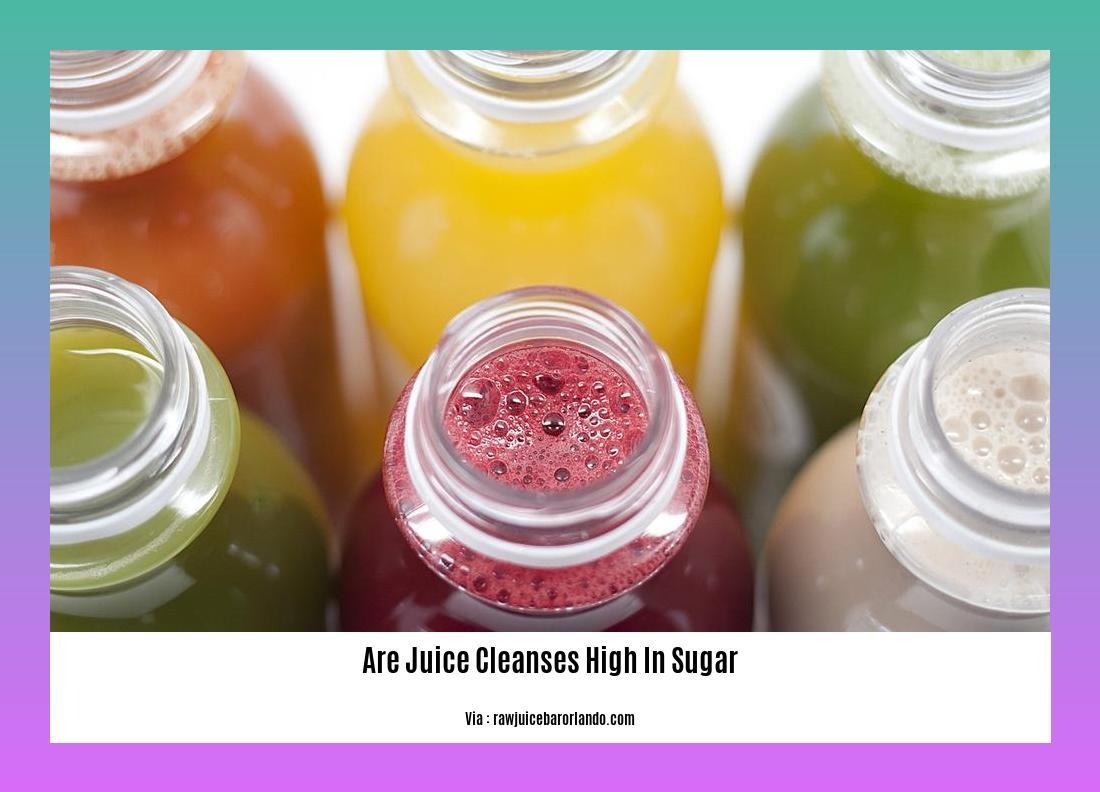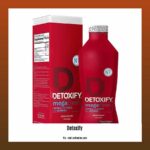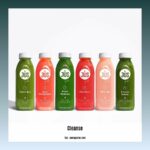Are juice cleanses high in sugar? This question has been a topic of debate among health-conscious individuals looking to detoxify their bodies and improve their overall well-being. In this article, we will delve into the truth behind popular dietary trends and debunk the myths surrounding juice cleanses. As a seasoned health and nutrition expert with a background in clinical research, I will use my expertise to analyze the sugar content of these cleanses and provide evidence-based insights that will empower you to make informed decisions about your health.
Key Takeaways:
- Juice cleanses are a type of detox diet where only vegetable and fruit juice is consumed for a short period.
- Advocates claim that juice cleanses can remove toxins from the body and aid in weight loss.
- Pros of juice cleanses include increased fruit and vegetable consumption and enhanced nutrient absorption.
- Cons of juice cleanses include a lack of fiber, low in calories which can cause low blood sugar, and potential nutrient deficiencies.
- Raw, unpasteurized organic juice is typically recommended for a juice cleanse, along with room temperature or lukewarm water for hydration.
- Foods high in oxalate, such as spinach and beet greens, should be avoided during a juice cleanse.
- It is important to consult with a healthcare professional before starting a juice cleanse to determine if it is suitable for your individual health needs and goals.
Are Juice Cleanses High in Sugar?
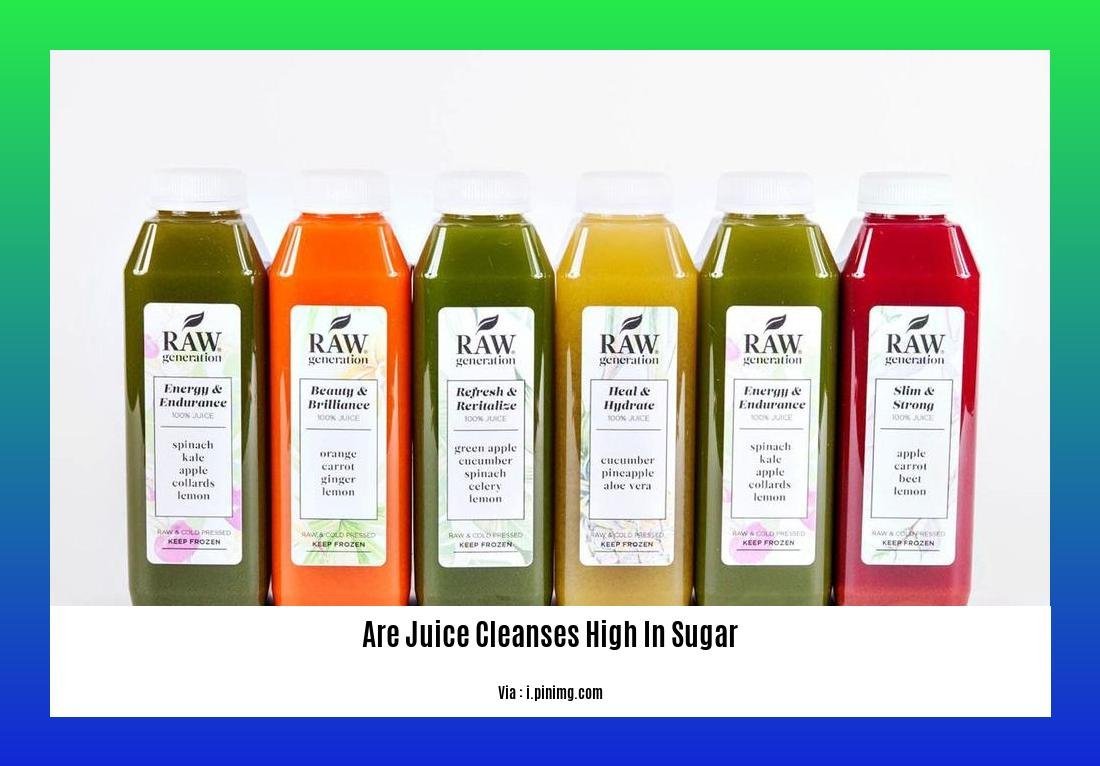
Juice cleanses have gained popularity as a way to detoxify the body and promote weight loss. But amidst the hype, it’s important to question whether these trendy cleanses are really as healthy as they claim to be. One common concern that arises is the sugar content of juice cleanses. Are these cleansing concoctions really high in sugar? Let’s dive deep into this topic and debunk the myths surrounding juice cleanses.
The Sugar Content of Juice Cleanses: The Truth Unveiled
You may be surprised to learn that juice cleanses can indeed be high in sugar. While the sugar content varies depending on the specific cleanse and the ingredients used, many juice cleanses primarily consist of fruit juice, which naturally contains a high amount of sugar.
Fruits are undoubtedly nutritious and packed with essential vitamins and minerals. However, the process of juicing removes the fiber found in whole fruits, leaving behind the natural sugars. This concentrated form of fruit juice can cause a spike in blood sugar levels, especially in individuals with conditions like diabetes or insulin resistance.
The Importance of Fiber: A Missing Component in Juice Cleanses
Fiber plays a crucial role in our diet. It aids in digestion, helps regulate blood sugar levels, and promotes a feeling of fullness. Unfortunately, juice cleanses lack the fiber that is abundant in whole fruits and vegetables. This absence of fiber leads to faster absorption of sugar, causing a potential imbalance in blood sugar levels.
All Sugars Are Not Created Equal
Remember that not all sugars are bad for you. Naturally occurring sugars found in whole fruits and vegetables are accompanied by beneficial phytonutrients and fiber, which moderate their impact on blood sugar levels. On the other hand, added sugars, such as those found in store-bought juices or sweetened beverages, should be limited in a healthy diet.
Making Informed Choices: Reducing Sugar Intake During a Juice Cleanse
If you’re considering a juice cleanse but concerned about the high sugar content, here are a few tips to help you make informed choices:
1. Opt for Veggie-Based Juices: Choosing juices made from vegetables rather than fruits can significantly reduce the sugar content. Vegetables like spinach, kale, cucumber, and celery are low in sugar and high in essential nutrients.
2. Balance Fruit and Vegetable Juice: If you prefer a fruit-based juice, try balancing it with a generous portion of vegetables to lessen the sugar load.
3. Consider Water as a Base: Instead of relying solely on juice, incorporating room temperature or lukewarm water during your cleanse can help maintain hydration without adding unnecessary sugar.
4. DIY Your Juice: Making your own juice allows you to control the ingredients and their quantities. Experiment with different combinations of fruits and vegetables to create a personalized blend that suits your taste preferences and dietary needs.
5. Monitor Your Intake: Pay attention to portion sizes and limit the duration of your cleanse. Prolonged juice cleanses can do more harm than good, as they may deprive your body of vital nutrients and lead to muscle loss.
Conclusion: Balancing Health and Sugar Intake
While juice cleanses can provide a quick nutrient boost, it’s crucial to consider the sugar content and its impact on your overall health. By focusing on veggie-based juices, balancing fruits and vegetables, and mindful portion control, you can minimize your sugar intake and make your juice cleanse a healthier endeavor. As always, consulting with a healthcare professional is recommended before embarking on any new dietary regimen.
So, before hopping aboard the juice cleanse bandwagon, remember to question the sugar content and make informed choices for your health and wellbeing.
To check the impressive PES stats of Antonio Valencia, click here.
Curious about whether criminal records are public in Canada? Find out here.
Discover if spouses of veterans are eligible for benefits by clicking here.
The Sugar Content in Popular Juice Cleanse Recipes
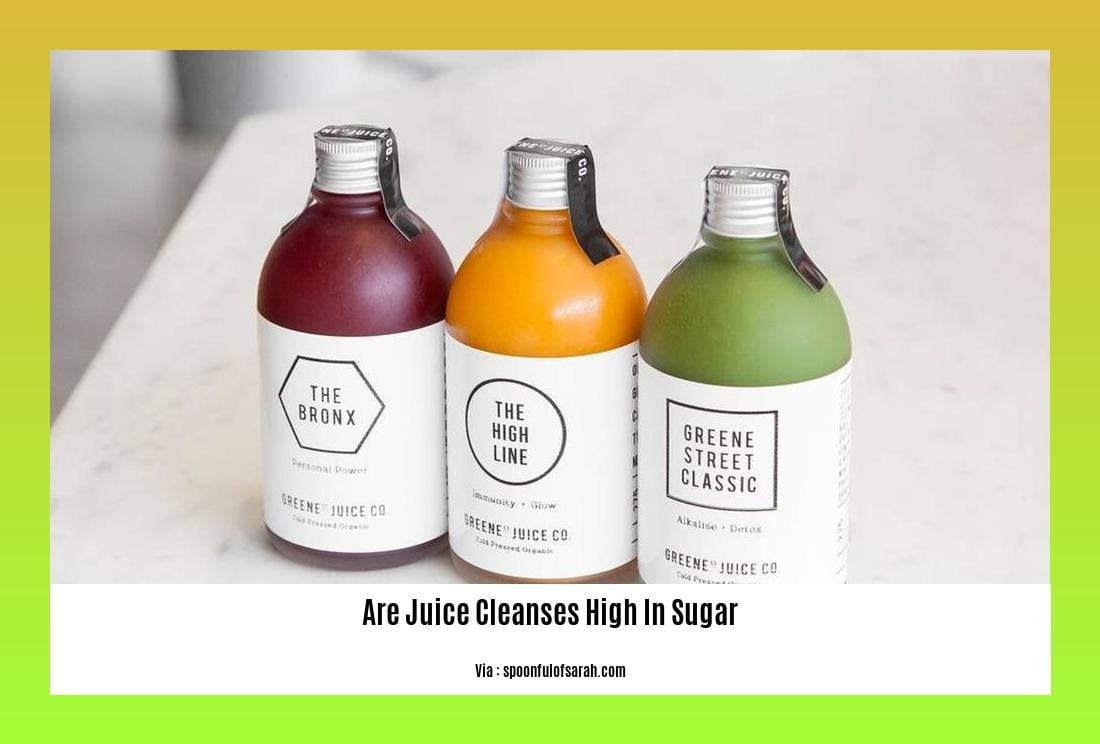
We all want to feel our best and take care of our bodies, which is why juice cleanses have become such a popular trend. But are juice cleanses high in sugar? Let’s debunk some myths and examine the truth behind the sugar content in popular juice cleanse recipes.
Juice cleanses are often touted as a way to detoxify the body and promote weight loss. While it’s true that a 3-day juice-only diet can lead to substantial weight loss, it’s also important to be aware of the sugar content in these cleanse recipes.
Fruits and vegetables with a high sugar content, like apple juice, are often used in juice cleanse recipes. When juicing, the fiber from these fruits is removed, which can cause a spike in blood sugar levels. This is important to consider, as fiber is not only essential for digestion but also for regulating blood sugar levels and promoting a feeling of fullness. By removing the fiber, the natural sugars in the fruits are absorbed more quickly, leading to a potential sugar overload.
To put it into perspective, some juices used in juice cleanses can have a sugar content similar to that of soda. While naturally occurring sugars in whole fruits and vegetables, accompanied by fiber, are better for our blood sugar levels than added sugars found in store-bought juices, it’s still crucial to moderation and be mindful of the sugar content.
So, how can we reduce our sugar intake during a juice cleanse? Here are some tips to keep in mind:
Opt for veggie-based juices: Instead of using primarily fruit juices, try incorporating more vegetables into your cleanse. This can help reduce the overall sugar content.
Balance fruit and vegetable juice: If you do include fruit juices, try to balance them out with vegetable juices to keep the sugar levels in check.
Use water as a base: Instead of relying solely on juices, consider using water as a base for some of your cleanse recipes. This can dilute the sugar content while still providing hydration and nutrients.
Make your own juice: By making your own juice, you have control over the ingredients and can choose fruits and vegetables with lower sugar content. This also allows you to experiment with different flavor combinations.
Monitor portion sizes: It’s important to be mindful of the portion sizes when consuming juice. While it may be tempting to drink large quantities, keep in mind that even natural sugars can add up.
Limit the duration of the cleanse: Juice cleanses can provide a quick nutrient boost, but it’s important to listen to your body and not prolong the cleanse for an extended period. This can help prevent any negative effects of a high sugar intake.
In conclusion, juice cleanses can be a beneficial way to reset your body and provide a quick nutrient boost. However, it’s crucial to consider the sugar content in popular juice cleanse recipes. By being mindful of the types and quantities of fruits used, as well as incorporating more vegetables and balancing out the sugar content, you can make informed decisions about your health and well-being.
Key Takeaways:
- Juice cleanses often consist of fruit juices, which are naturally high in sugar.
- Juicing removes the fiber from fruits, leading to a quicker absorption of sugars and potential blood sugar spikes.
- It’s important to opt for veggie-based juices, balance fruit and vegetable juice, use water as a base, make your own juice, monitor portion sizes, and limit the duration of a cleanse.
- Juice cleanses can provide quick nutrient boosts, but considering the sugar content and consulting a healthcare professional is crucial.
Sources:
– The Truth About Juice Cleanses | MyFitnessPal
– Juice cleanse: Benefits, risks, and effects – Medical News Today
The Potential Health Risks of Consuming High Sugar Juice Cleanses
Juice cleanses have gained popularity in recent years, with many people turning to them as a quick fix for weight loss and detoxification. However, it is important to understand the potential health risks associated with consuming high sugar juice cleanses. In this article, we will debunk myths and examine the truth behind this popular dietary trend.
The Dangers of High Sugar Juice Cleanses
1. Blood Sugar Imbalance
High sugar juice cleanses can cause a spike in blood sugar levels. Juice cleanses often consist of fruit juices, which are naturally high in sugar. When fruit is juiced, the fiber is removed, causing the sugar to be absorbed more quickly into the bloodstream. This can lead to blood sugar imbalances and may contribute to energy crashes and mood swings.
2. Lack of Essential Nutrients
Another concern with high sugar juice cleanses is the lack of essential nutrients. Juices are often low in protein, which is important for overall health and muscle maintenance. Additionally, juice cleanses can lead to a deficiency in other essential nutrients, such as healthy fats and fiber.
3. Digestive Issues
The absence of fiber in juice cleanses can lead to digestive issues. Fiber is crucial for promoting regular bowel movements and maintaining a healthy digestive system. Without fiber, individuals may experience constipation, bloating, and discomfort.
4. Temporary Weight Loss
While juice cleanses may result in temporary weight loss, these results are rarely long-lasting. Most of the weight lost during a juice cleanse is water weight and can quickly return once normal eating patterns resume. It is important to recognize that sustainable weight loss requires a balanced and nutritious diet, rather than a short-term cleanse.
5. Potential Side Effects
High sugar juice cleanses can also lead to various side effects, including fatigue, irritability, diarrhea, bad breath, and unstable blood sugar levels. These side effects can be attributed to the highly concentrated sugar content and the lack of other important nutrients.
Key Takeaways:
- High sugar juice cleanses can cause blood sugar imbalances and contribute to energy crashes.
- Juice cleanses often lack essential nutrients, such as protein, healthy fats, and fiber.
- The absence of fiber in juice cleanses can lead to digestive issues.
- While juice cleanses may result in temporary weight loss, the weight is often quickly regained.
- Potential side effects of high sugar juice cleanses include fatigue, irritability, diarrhea, bad breath, and unstable blood sugar levels.
Sources:
– The Truth About Juice Cleanses | MyFitnessPal
– Juice cleanse: Benefits, risks, and effects – Medical News Today
Tips for Choosing Low Sugar Alternatives for a Juice Cleanse
Juice cleanses have become a popular trend in the health and wellness world, with many people looking to detoxify their bodies and jumpstart weight loss. However, it is important to consider the sugar content of the juices you consume during a cleanse. While fruits are naturally high in sugar, there are ways to choose low-sugar alternatives that can still provide the benefits of a cleanse without the unnecessary sugar intake. Here are some tips to help you make informed choices for a low-sugar juice cleanse:
1. Opt for Veggie-Based Juices
Instead of relying solely on fruit juices, opt for vegetable-based juices during your cleanse. Vegetables like kale, spinach, cucumber, and celery are low in sugar and rich in essential nutrients. These juices can provide a refreshing and nutrient-packed alternative to fruit juices.
2. Balance Fruit and Vegetable Juice
If you prefer a mix of fruits and vegetables in your juices, aim for a balance that leans more towards vegetables. This way, you still get the benefits of fruit flavors without consuming excessive sugar. Adding a small amount of fruit, such as berries or green apple, can add natural sweetness to your juice without going overboard.
3. Use Water as a Base
To further reduce sugar content, consider using water or coconut water as a base for your juice instead of fruit juices. This can significantly decrease the sugar content while still maintaining hydration and flavor.
4. Make Your Own Juice to Control Ingredients
Making your own juice allows you to have control over the ingredients and their quantities. You can experiment with different combinations of fruits and vegetables to find the perfect balance for a low-sugar cleanse. This way, you can customize your juices to suit your taste preferences and minimize sugar intake.
5. Monitor Portion Sizes
Even when consuming low-sugar juices, it’s important to monitor portion sizes. While juices can be nutritious, they still contain calories and natural sugars. Be mindful of how much juice you consume during your cleanse to avoid excessive sugar intake. Consider using smaller glasses or diluting your juice with water to help manage portion sizes.
6. Limit the Duration of the Cleanse
When embarking on a juice cleanse, it’s important to limit the duration. Extended juice cleanses can lead to imbalances in nutrient intake and potential health risks. Consider a short-term cleanse, such as a 3-5 day period, to minimize the impact of sugar on your overall health.
Key Takeaways:
- Choosing low-sugar alternatives for a juice cleanse is important for managing blood sugar levels.
- Opt for vegetable-based juices to reduce sugar content.
- Aim for a balance between fruit and vegetable juices.
- Use water or coconut water as a base to decrease sugar intake.
- Make your own juice to have control over ingredients and quantities.
- Monitor portion sizes and consider limiting the duration of your cleanse.
For more information on juice cleanses and their sugar content, please refer to the following sources:
- The Truth About Juice Cleanses | MyFitnessPal
- Juice cleanse: Benefits, risks, and effects – Medical News Today
FAQ
Q1: Are juice cleanses high in sugar?
A1: While juice cleanses often include fruits, which contain natural sugars, the sugar content can vary depending on the specific cleanse and ingredients used. It is important to be mindful of the types and amounts of fruits being used in the cleanse, as some fruits have higher sugar content than others.
Q2: Can a juice cleanse lead to unstable blood sugar levels?
A2: Yes, juice cleanses can potentially lead to unstable blood sugar levels, especially for individuals with diabetes or hypoglycemia. Since juice cleanses are low in calories and often lacking in fiber, they can cause fluctuations in blood sugar levels, resulting in symptoms such as dizziness, weakness, and hunger.
Q3: Do juice cleanses provide enough fiber?
A3: No, most juice cleanses are lacking in fiber. Fiber is an essential nutrient for digestive health and maintaining stable blood sugar levels. Juice cleanses typically remove the fiber content from fruits and vegetables, as the juice is extracted and the pulp is discarded.
Q4: Should I be concerned about the sugar content in juice cleanses?
A4: Yes, it is important to be aware of the sugar content in juice cleanses, as some juices can have a high sugar content similar to soda. Consuming excessive amounts of sugar, even if it comes from natural sources like fruits, can have negative impacts on overall health and contribute to weight gain.
Q5: Are there alternatives to juice cleanses that are lower in sugar?
A5: Yes, there are alternatives to juice cleanses that are lower in sugar. For example, incorporating whole fruits and vegetables into your regular diet or opting for vegetable-based juices instead of fruit-based ones can help reduce sugar intake while still providing essential nutrients. It is also important to focus on a balanced and varied diet to support overall health and wellness.
- Senior at What Age: Benefits & Eligibility Guide - March 29, 2025
- Unlocking Senior Benefits: How Old is a Senior? Your Complete Guide - March 29, 2025
- Master Russian Politeness:A Guide to Saying Please - March 29, 2025
